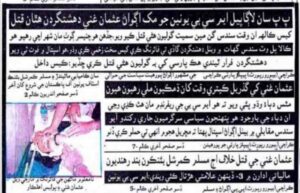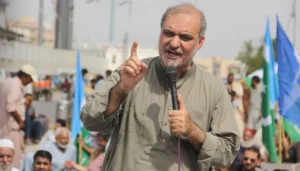In memory of Usman Ghani, a labour leader with commitment

In memory of Usman Ghani, a labour leader with commitment
Pakistan has long history of trade union movement and labour leaders. From Mirza Muhammad Ibrahim to Kaneez Fatima, Usman Ghani Usman Baloch, Dr Aizaz Nazir, and Karamat Hussain, Usman Ghani’s name is in the list of assassinations of political and labour leaders in Karachi.
Usman Ghani an active leader of the anti-bank privatization movement was assassinated on September 17, 1995. Today we are celebrating his 26th death anniversary.
The labor leaders fought for the rights of the working people in this country and these brave labour leaders endured long hardships of incarceration for the protection of the rights of the people.
Memories of those leaders are still alive. History is witness to it that their families suffered economic ruin, but they continued their struggle.
As was saw textile workers movement in 1960s and early 1970s, there was also an anti- bank privatization movement. Usman Ghani was prominent leader of this movement, he scarified his life for the cause of working class and was martyred at the hands of terrorists.
Usman Ghani started his professional life by getting a job in the Muslim Commercial Bank Limited. Those who met him or had been in struggle with him, knew how much close the working class interest were to him.
He was associated with the Pakistan People’s Party. In 1972, Usman was elected Central President of the Muslim Commercial Bank of Pakistan. He fought the war of employees’ interests with courage. For the rights of the employees of Muslim Commercial Bank, the efforts he put in, are unforgettable.
 8
8
In 1973 he was arrested for the first time for not compromising on the rights and demands of the employees. At a time when he was addressing a protest rally in the central hall of the bank to emphasize the acquisition of profit bonuses for employees, on the behest of the bank management, the police force rushed to the stage and resorted to baton charge. The leader of protesting employees was arrested and taken to Central Jail Karachi.
Usman Ghani was among one of the most popular leaders of Muslim Commercial Bank because of his commitment, bravery and his vision for working class, which made him non compromising in the matter of workers. Therefore he enjoyed much respect and held a prominent position in Pakistan’s banking industry’s trade unions and labor movement. He thought working class question is interlinked with the democratic question. Being active leader of labour and trade unionist he was also part of democratic movement.
The labour leader actively took full part in the restoration of democracy under the leadership of Mohtarma Shaheed Benazir Bhutto and in this regard he had to endure the hardships of imprisonment. That is why he remained behind the bar under the military dictator regime and also in the PML-N government.
His services were highly valued and appreciated by Mohtarma Benazir Bhutto and she used laud his struggle and commitment even in the public meetings. He was also awarded the Provincial Assembly seat in the elections. Shaheed Usman Ghani remained but he also endured the hardships of imprisonment even during the rule of his own party, the Pakistan People’s Party. Because he preferred to go to jail for the interests of the labourers, instead of compromising his principles.
The last arrest of his life was made in February 1991 during Nawaz Sharif government. It came into action at a time when the CBA unions of more than 160 nationally owned entities in Pakistan were protesting against privatization.
Usman Ghani and with other prominent labour leaders were jailed for many months. In the meantime, the government of the day sold the Muslim Commercial Bank to the private sector.
Usman Ghani worked very hard and patiently and restoring the fragmented time of the practical workers and restored the lost reputation of the trade union again in a very short time. He made trade unions an invincible force in bank once and for all. Usman Ghani started a new and determined era of his life but the forces hostile to the workers’ movement and the democratic system, decided something else against the people.
On September 17, 1995, Usman Ghani left his residence at Chanesar Goth for his office, when tragic incident took place. At the middle of the bridge, unknown assassins attacked and martyred selfless leader. The working class of Karachi in general nad banking industry workers in particular lost a true leader.
Memory and the sacrifices Usman Ghani are till today source of inspiration.
People from working class feel comfortable when they see his son Saeed Ghani holding portfolio of labour ministry in Sindh.






